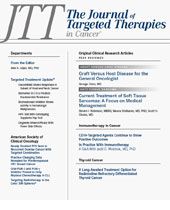Dacomitinib Shows Responses in Subset of Head and Neck Cancer
Dacomitinib has demonstrated potential as treatment for a subset of patients with recurrent squamous cell carcinoma of the head and neck (SCCHN).
Byoung Chul Cho, MD, PhD

Byoung Chul Cho, MD, PhD
Dacomitinib has demonstrated potential as treatment for a subset of patients with recurrent squamous cell carcinoma of the head and neck (SCCHN), according to a phase II clinical trial presented at the 2014 Annual Meeting of the American Association for Cancer Research. The study found that response was associated with 2 factors: no defects in phosphoinositide-3-kinase (PI3K) signaling and no sign of excessive inflammation.
Investigators acknowledged that results need to be confirmed in phase III clinical trials. They plan to optimize chances of success by enrolling patients in a phase III trial according to biomarker data found in the phase II trial no alterations in PI3K pathway and no overexpression of proinflammatory cytokines, explained lead author Byoung Chul Cho MD, PhD, Yonsei Cancer Center, Seoul, the Republic of Korea.
Dacomitinib blocks the activity of the epidermal growth factor receptor (EGFR). “Most SCCHN express elevated levels of EGFR, suggesting that this drug will work,” Cho said.
The phase II trial enrolled 48 patients with recurrent and/or metastatic SCCHN despite treatment with platinumcontaining chemotherapy; patients were treated with oral dacomitinib once daily. Response, assessed according to RECIST criteria, showed that 10 patients had a partial response (PR, 21%) and 31 patients had stable disease (65%). After a median follow-up of 8.4 months, median time to disease progression was 3.9 months and median overall survival time was 8.2 months.
Genetic analysis of tumor samples identified markers associated with response. These included mutations in either PIK3CA or phosphatase and tensin homolog (PTEN), associated with median progression-free survival (PFS) of 2.5 months compared with a median of 5.4 months in patients without these mutations. Two patients with tumors lacking these 2 mutations had median progression-free survival of 13.1 months and 18.9 months, respectively.
In addition, PFS was worse in patients with high levels of expression of genes linked to inflammation, including IL6, IL8, PTGS2, and PLA2G2A, versus low levels. Median PFS was 1.9 months versus 6.8 months, respectively. Patients with low gene expression of these cytokines tended to have higher response rates (overall response rate of 40% vs 0% for those with high expression) and unusually long durations of response (18.9 months vs 5.4 months, respectively).
